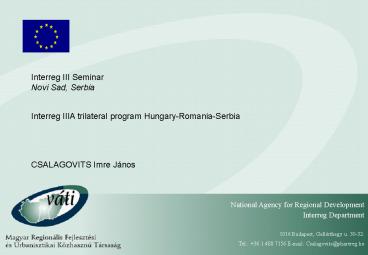INTERREG PowerPoint PPT Presentation
1 / 20
Title: INTERREG
1
Interreg III Seminar Novi Sad, SerbiaInterreg
IIIA trilateral program Hungary-Romania-Serbia
CSALAGOVITS Imre János
National Agency for Regional Development Interreg
Department 1016 Budapest, Gellérthegy u. 30-32.
Tel. 36 1 488 7156 E-mail Csalagovits_at_pharereg
.hu
2
- I. Hungarian experience in cross-border
co-operation (short summary) - II. Preparation of new Interreg IIIA cross border
programme Serbia-Romania-Hungary - III Implementation institutions and procedures
3
Interreg IIIA Programs (2004-2006) Borders and
external finanacing instruments
- Borders
- Internal
- - Austria
- - Slovakia
- - Slovenia
- External
- Romania (Phare)
- Ukraine (Tacis)
- Croatia (Cards)
- Serbia (Cards)
UR
SK
AU
RO
SL
CR
YU
4
Programs and models
- INTERREG III A programs
- Internal (bilateral) program
- - Austria-Hungary
- New internal-external trilateral programs
- - Slovakia-Hungary-Ukraine
- - Slovenia-Hungary-Croatia
- New external trilateral program
- - Hungary-Romania-Serbia
- Interreg IIIB program
- CADSES program
- Interreg IIIC program
- Interreg IIIC program, East zone
- Interact, Espon
UR
SK
AU
RO
SL
CR
YU
5
Phare and InterregPhare CBC Programs in Hungary
1995-2006
1995-2001 programs AUSTRIA 62
MEUR Au-Slovenia 3 MEUR Au-Slovakia 3
MEUR Romania 24 MEUR SLOVAK 6
MEUR SLOVEN 4 MEUR TOTAL 102
MEUR 2002-2003 programs AUSTRIA 20
MEUR ROMANIA 10 MEUR SLOVAK 4
MEUR SLOVEN 4 MEUR TOTAL 38 MEUR
6
Phare and InterregNational Phare Programme
2002-2003
- Twinning light transfer of experience of the
Member States - Technical Assistance documents (ex ante,
financial management,etc), training, information
campaign (seminars, publications) - CADSES Phare Project Fund / Interreg IIIC PF
- Pilot Small Project Funds at the non-CBC (future
external) borders (Croatia, Ukraine, Serbia)
7
Pilot Small Project Fund Serbia-Hungary
- Financed by the national Phare program for
Hungary - 2003 program 0.5 M EUR (be developed jointly by
September) - In principle, Phare CBC SPF rules are applied
- Serbian Partners will participate in the decision
making (as members of the Evaluation Committee) - Soft projects for people to people actions
- Serbian partners can be financed as partners
within the projects
8
Interreg III Indicative allocation of funds
between the 3 strands (Hungary) (2004-2006)
9
Indicative allocation of Interreg funds between
Interreg IIIA programs (Hungary, 2004-2006)
10
Summary
- High expectations
- Limited funding
- Concentration 2-3 priorities, few measures
- Genuine cross-border character
- Innovative approach
- Competition between projects, transparent
project selection - Co-ordination with mainstream programmes and
Phare - Simple implementation structures
11
Preparation of the new Interreg IIIA programme
- Task force meetings 1th Békéscsaba (Hu) 2nd
Arad (Ro), 3rd Novi Sad (Se) - Seminars for strategic programme development
Arad (Ro) - First draft Programme (CIP) end of July
- Ex ante evaluation August, September
- (Pre-) Joint Monitoring Committee Meeting
Mid-September - Submission of draft CIP to the European
Commission end of September - Development of the Programming Complement
August-Deecember
12
Preparation of the new programmes
- Joint Task Force
- lead the programming process
- composed by the reprentatives of
national/regional/local level - 2-4 experts/country
- Expert group (preparation of the strategic part
of CIPs and programme complements) - Preferably composed by experts from the concerned
countries - technical preparation of the documents
- organization of the workshops
13
Cross border cooperation between Hungary, Romania
and Serbia (2004-2006)
- Border between Hungary and Romania - external
border of EU - Border between Serbia and Hungary external
border of EU - Border between Serbia and Romania non EU border
- EC proposed new trilateral program
Romania-Hungary-Serbia (2004-2006)
14
External and Internal components
- Internal components activity within the Member
States (Hungary) will be under the framework of
INTERREG programmes, and they will therefore
remain in the Structural Funds framework - External components of the program will remain
within the framework of the respective Regulation
(Phare, Cards), and will implement the respective
Strategy/ Indicative/Action programmes adopted by
the Commission following consultation of the
relevant management committee. - From the perspective of the stakeholders,
however, the two components will operate as one
single Neighbourhood Programme.
15
Neighbourhood Programmes
- The European Commission proposed for the period
between 2004-2006 the introduction of
Neighbourhood Programmes covering the external
borders of the enlarged Union. These programmes
will be prepared jointly by relevant stakeholders
on both sides of the border. - Between 2004-2006, Neighbourhood Programmes
should operate within the existing legal
framework and should seek in a pragmatic and
dynamic way to improve current procedures and
increase the effectiveness and visibility of
co-operation
16
Problems and possible solutions
17
Financial allocations Hungary/Romania/Serbia CBC
programme 2004-2006
- Interreg allocation for Hungary
- Kopenhagen 13.12.2003 (financial allocations for
Interreg) - Interreg allocation Hungary 68.7 MEUR all
Interreg strands - 24 M EUR /3 years for the Se/Ro/Hu program
- min 25 national co-fianancing
- Phare CBC allocation for Romania
- 5 M EUR/year for the Ro/Hu border (?)
- ? M EUR/year for the Se/Ro border
- CARDS allocation for Serbia ?? (!)
18
Programme Implementation
- Role of different actors, responsibilities and
tasks (2004-2006) - Joint Monitoring Committee (JMC, MC)
- Joint Steering Committee (JSC, SC)
- Managing Authority (MA), National Authority (NA)
/ National Contact Point (NCP) - Paying Authority (PA)
- Joint Technical Secretariat (JTS), Info Points
(IPs) - Implementing Agencies
19
Project development
- Projects can be identified, generated and
developed by different organisations located in
the eligible border area (defined by the
programme complement / related regulations) - Projects should have cross border impacts
- For jointly developed/managed projects priority
should be given - Project development and management and programme
administration should be completely separated - Conflict of interest should be avoided
20
National Agency for Regional Development (VÁTI
Kht Területfejlesztési Igazgatóság) Interreg
Department Csalagovits Imre János Head of
Department H - 1016 Budapest, Gellérthegy u.
30-32. Tel. 36 1 224 3273 E-mail
csalagovits_at_pharereg.hu

